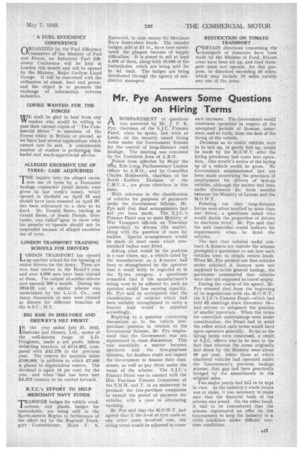Mr. Pye Answers Some Questions on Hiring Terms
Page 19

If you've noticed an error in this article please click here to report it so we can fix it.
ABOMBARDMENT of questions was answered by Mr. J. F. E. Pye, chairman of the S.J.C. Finance
Panel, when he spoke, last week at Leeds, on the recently issued hiring terms under the Government Scheme for the control of long-distance road haulage. The meeting was convened . by the Yorkshire Area of A.R.O.
Points from 'speeches by Major the Htn. Eric Long, Parliamentary Liaison Officer to A.R.O., and by Councillor Charles Holdsworth, chairman of the North Eastern Division of the C.M.U.A., are given elsewhere in this issue.
With reference to the classification of vehicles for purposes of payments under the Government Scheme, Mr.
Pye said that final arrangements had not yet been made. The S.J.C.'s Finance Panel was to meet Ministry of War Transport officials on Thursday (yesterday) to discuss this matter, along with the question of rates for trailers. Special arrangements would be made to meet cases where nonstandard bodies were fitted.
Asking what would be the position in a case where, say, a vehicle rated by the manufacturer as a 6-tonner had
been so strengthened by the. operator that it could fairly be regarded as in
the 7i-ton category, a questioner remarked that if the manufacturer's rating were to, be adhered to, such an operator would lose earning capacity. Mr. Pye said he anticipated that the', classification of vehicles which had been suitably strengthened to carry a heavier load would be adjusted accordingly.
Replying to a question concerning discussions as to the vehicle hire purchase position in relation to the Government Scheme, Mr. Pye emphasized that the Government was not • represented in these discussions. This was essentially a matter between
operators and the hire-purphase interests, for hauliers could not expect the Government to finance their businesses, as well as pay them under the terms of the scheme. The S.J.C.'s Finance Panel was in contact with the Hire Purchase Finance Committee of the .S.M.M. and T. in an endeavour to persuade the hire-purchase companies to extend the period of payment for vehicles, with a view to alleviating hardship.
Mr. Pye said that the M.O.W.T. had agreed that if the level of tyre costs or any other costs involved rose, the hiring terms would be adjusted to cover such increases. The Government would reimburse operators in respect of the
• unexpired periods of licences, •insurance, and so forth, from the date of the hiring of -the vehicle.
Decisions as to which vehicles were to be laid up, or partly laid up, would be made by the M.O.W,T. -after the hiring provisions had come into operation. One month's notice of the laying up Of a vehicle would be given. No Government announcement had yet been made concerning the provision of employment for drivers of laid-up vehicles, although the matter had been under discussion for three months between the Ministry of Labour and the M.O.W.T.
Pointing out that long-distance lorries were often handled by more than one driver, a questioner asked who would decide the proportion of drivers to machines hired. Mr. Pye said that the unit controller would indicate his requirements when he hired the vehicles.
The fact that vehicles under contract A licences are outside the scheme prompted a questioner to ask how such vehicles were to obtain return loads. When Mr, Pye pointed out that vehicles under contract A licences were not supposed to tackle general haulage, the questioner commented that vehicles were also not supposed to travel empty. During the course of his speech, Mr. Pye stressed that from the beginning of its negotiations with the M.O.W.T., the S.j.C.'s Finance Panel—which had held 62 meetings since December 16— had striven to safeguard 'the position of smaller operators. When the terms for controlled undertakings were under consideration, the Panel had in mind the reflex which such terms would have upon operators generally. So far as the hiring terms were concerned, a result_ of S.J.C. efforts was to be been in the fact that whereas the terms originally laid down by the Ministry were' about 30 per cent, below those at which chartered vehicles had operated under .the Government's previous haulage scheme, that gap had been practically bridged by the amendments to the original rates.
Twt> major points had had to be kept in view. As the industry's whole future was at stake, it was necessary to make sure that the financial basis of the scheme was sound. On the other hand,
it had to be remembered that the scheme represented an offer by. the Government to keep the industry in a virEe condition under difficult wartime conditions.




















































